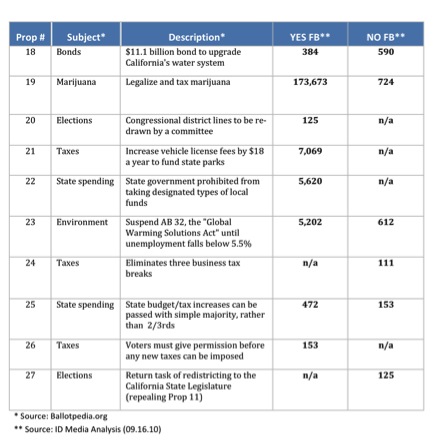You probably have better things to do with your time than crunching numbers gathered from dozens of political Facebook fan pages. But this is exactly what our social media strategists love to do in their spare time (it’s a little geeky, I know).
Our team recently did such an analysis on the Facebook fan pages of the upcoming California ballot initiatives. And, without spending too much time, we discovered something worth considering: ballot initiatives that enjoy a high level of popular appeal have a significantly higher number of Facebook fans than those dealing with more typically policy related matters. The table below summarizes number of Facebook fans for the various Yes and No initiative campaigns on the California November ballot. It becomes clear that the "sexier" an issue is culturally, the higher the level of social media engagement.

Take the NO on Prop 24 campaign (the Facebook page we surveyed with the least followers) and compare it to the YES on Prop 19 campaign (the one with the most). As of September 16th, NO on Prop 24 had only 111 fans, while YES on Prop 19 had an overwhelming 173,673 fans. Just think about that and you will start to get a handle on that "something relevant" I spoke of above. Put a question to this data: does YES on 19 have 173,673 fans because its promoters have more technological savvy than the NO on 24 supporters, or, is the vast difference in numbers due to the popular appeal of the issue related to Prop 19?
Well, the answer seems fairly obvious; weed is a far more engaging cultural topic, with much wider popular appeal than, than the elimination of specific business taxes. Let’s not confuse the issue, as a policy matter it could be argued that the content of Prop 24 is of far great significance for the economic wellbeing of Californians than Prop 19. The reality is, that there are far fewer people in touch with the economic issues related to the tax relief proposed by Prop 24, than there are who are aware of the major social significance related to the legalization of marijuana.
Okay, you say, "that is kind of interesting to think about, but where is the ‘sizzle’ in all of this?" The answer is that this should mean a whole lot to folks who run political and public affairs campaigns of all shapes and sizes. It says that while social media plays an important role in political campaigns, it is not the silver bullet that some might think it is. The data suggests that social media is an important communication means for disseminating information, updating supporters, and even addressing their concerns or integrating their ideas.
But here is the bottom line: by itself, social media does not generate significantly greater interest in a campaign issue or a wider audience of supporters, nor can it carry on its back the broad voter persuasion needs of most campaigns. For social media to really tip the scales heavily in favor of a particular issue or candidate, there must already by a substantial amount of existing social buzz or popular support to tap.
At this point, you might object that far too much is being read into the significant difference of Facebook support for campaigns 19 and 24. That is a reasonable objection, but as Lee Corso of College Football GameDay would say, "not so fast my friend." Facebook data from some of the other California ballot initiatives reinforces the argument. For instance, Yes on Prop 21 and Prop 22 are examples of initiatives with moderate to low social significance.
So here is the interesting bit of information offered for political junkies to chew on: campaign issues with strong popular appeal can expect to enjoy strong social media support, while campaign issues with moderate to low popular appeal should not expect high social media involvement without significant investment in paid media (both online and offline). For those who are supporting a campaign issue or candidate without broad social or cultural awareness they will need to spend some real thought in advance to gin up support for their particular cause. Once a base of support is constructed around a socially attractive, properly framed issue, campaigns can more effectively reinforce their platform through the use of social media.

